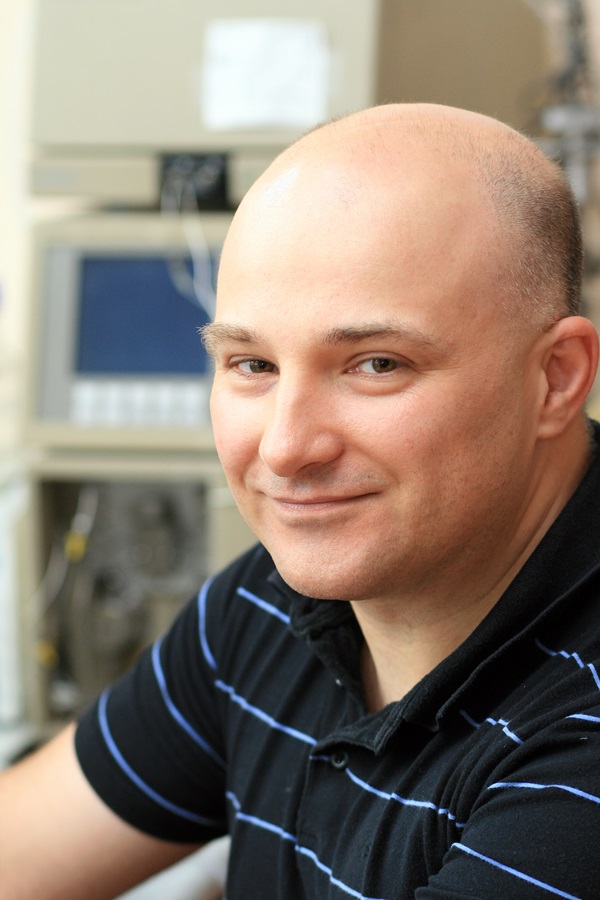Therapeutic vaccine for breast cancer – a new project in Tomasz Lipiński’s team
Patients with a diagnosis of breast cancer often hear from doctors – cancer is not a sentence. Modern medicine offers them various treatment methods depending on the stage of the disease: surgery, chemotherapy, radiation therapy, or expensive monoclonal antibody therapy. Unfortunately, the mortality rate among patients remains high: in 2022, 2.3 million breast cancers were diagnosed worldwide, of which 670,000 proved fatal (WHO data).
Scientists from Vaxican company (Dr. Łukasz Rąbalski and Dr. Krzysztof Łepek) and from Dr. Tomasz Lipiński’s team – Bioengineering Group at Łukasiewicz – PORT have been awarded a grant of PLN 4.6 million in the competition for research in the area of drug safety, innovative therapies and drugs of the future announced by the Medical Research Agency. The established Vaxican – PORT consortium will carry out the project “Optimization of production and purification of virus-like particles (VLPs) presenting the HER-2 antigen as a candidate for a therapeutic vaccine against breast cancer: process scaling and preclinical product characterization.” It is expected to result in the implementation of a therapeutic vaccine, i.e., one that is used in patients already diagnosed with cancer.

Train the immune system to fight cancer
The HER-2 antigen is a well-characterized marker of breast cancer, among other things. Scientists decided to use it as a molecular target for a vaccine. First, the Gdańsk-based company Vaxican will produce virus-like particles (VLPs), which, unlike viruses, do not contain genetic information and cannot multiply on their own in the human body. – They will be used to present to cells of the immune system the HER-2 cancer antigen embedded in the proteins that make up the virus capsid, Dr. Lipiński explains. – An important part of the process is the purification of these particles, and this task will be carried out at Łukasiewicz – PORT. The process of producing VLP particles requires the use of cell lines. Once the cells are ruptured to release the VLP, their entire contents, thousands of different proteins and other molecules, are released. Before the vaccine particles reach patients, they must be highly purified and characterized. We will create an immunoaffinity column for this purpose, which will catch the VLP particles presenting the HER-2 antigen and make it possible to separate them from the other components.
The purified virus-like particles with the HER-2 antigen will be sent back to Gdańsk, where the consortium leader, Vaxican, will conduct further development of the vaccine, i.e. until the first phase of clinical trials is completed. The final result is expected to be the introduction of the vaccine to the market in cooperation with pharmaceutical companies active in the field of oncology.
Therapeutic vaccine more effective than monoclonal antibodies?
Scientists expect that introducing a therapeutic vaccine containing virus-like particles with the HER-2 antigen into the patient’s body will mobilize the patient’s immune system to fight back. As in the case of infection, the immune system will produce specific antibodies to the viral particles and to the HER-2 antigen, which will help fight cancer cells that have the antigen.
– This arrangement allows better control of the level of therapeutic antibodies than can be achieved by therapy with monoclonal antibodies produced outside the body and usually administered intravenously. As a result, the side effects of the therapy can be minimized and its cost can be significantly reduced – concludes the leader of the Bioengineering Group. Besides, the vaccine will trigger cellular immunity mechanisms, which will give it an additional advantage over drugs based on monoclonal antibodies. The vaccine is expected to have greater potential to inhibit tumor growth and eliminate cancer cells than drugs based on antibodies alone.
The planned work is expected to end in preclinical studies, but the ultimate goal is to bring the vaccine to market. The road from an idea to a drug on a pharmacy shelf is long and requires enormous financial resources. Dr. Lipiński adds with optimism – We believe that the success of the research will enable the project to attract the interest of more pharmaceutical partners and secure funding for the next stages of work on the vaccine.

